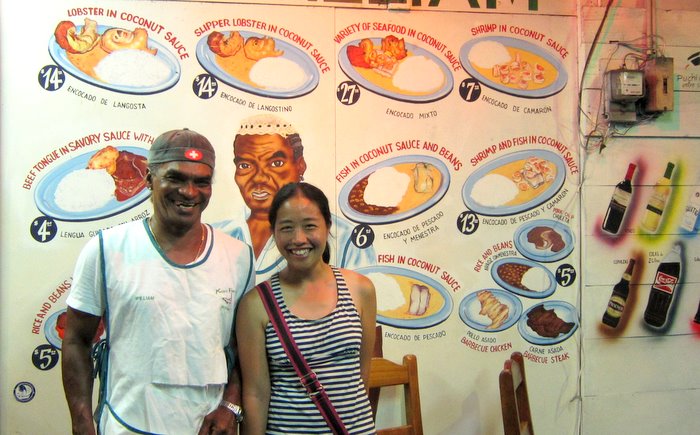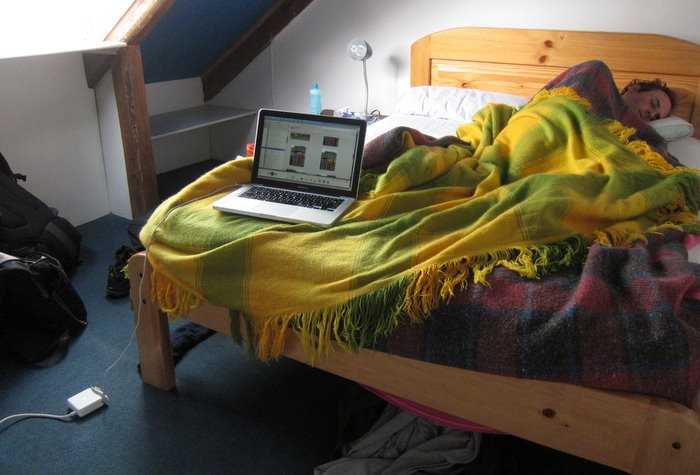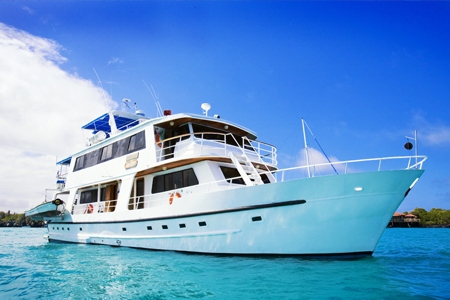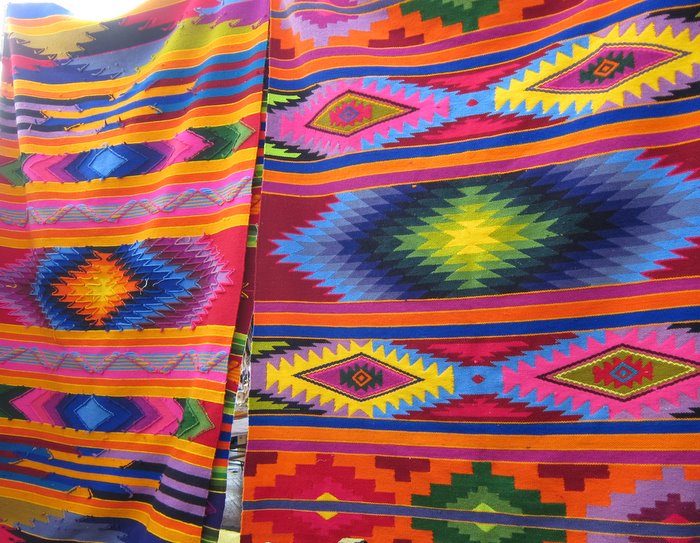As we all know, traveling is not without challenges. Especially when you’re traveling in a country where you don’t speak the language. Especially if you’re traveling in a country where you don’t speak the language during rainy season.
With so many waterfalls and rivers around Baños, it’s no wonder that every tour agency in town offers some sorts of water related activities, like canyoning.
I had my doubt about this whole canyoning thing at first. Rappelling is just a fancy name ‘Don’t let go of that brake hand or you’ll get in serious trouble.’
We’ve been in here for 2 weeks now. The longest we’ve ever stayed in a place. And the crazier part? We now have a routine. We have English classes to teach and children to supervise. We have Spanish classes to go to. We’ve been busy.
We took close to 800 pics during our trip to Galapagos. Which is not that many compared to other people. My seasickness prevented me from being photo-happy like I usually am.
Regardless, we’d love to share some of these pictures along with the stories behind them with you guys. Hope you enjoy!
I have to admit that I hit the ‘Couchsurf with me’ button as soon as I saw that they keep llamas at the place we were looking to couchsurf in Quito.
“Llamas?! How cool! How… South American!” I squealed with delight.
Visions of ourselves frolicking on top of llamas in high Andean meadows quickly came to mind.
Puerto Ayora, Galapagos, Ecuador
Finding a budget place to eat in Galapagos, especially if you’ve given up on cooking in hostels, was tough.
Still reeling from the price tags of the waterfront restaurants of Puerto Ayora, we stumbled across this eating place on a street called Charles Binford, 3 blocks inland.
Sharing the cramped eating space with a group of local cops and taxi drivers confirmed what our $5 lunch bill told us: This street, is the place to eat on a budget in downtown Puerto Ayora.
Charles Binford Ave at night
We ate here for almost all of our meals.
Give the local’s favorite, encocado de pescado (fish in coconut curry) a try. For $6, it’s not cheap by the mainland standard, but compared to everything else in Puerto Ayora, it’s a steal.
And it’s delicious.
Then again, coconut milk makes everything delicious.
Of the many restaurants there, one stood out
Our favorite restaurant is this gem called K.F. Williams.
Remember the restaurant with an identity crisis in Cartagena? Well, we might’ve found one that tops that. Check this out: the owner has murals of himself painted on the walls of the restaurant.
A mural at K.F. Williams of K.F. Williams' head
Not only that, when I asked for a menu, the girl pointed to the wall behind me.
He’s got the menu painted, PAINTED, on the wall of the restaurant, complete with prices. Not painted on a board that hung on a wall, but actually on the wall itself.
I imagine they probably don’t change the menu and the prices too often there.
And who do you think prepared encocado de pescado? Nobody but William himself. We recognized him right away (how could we not?). And of course we had to drag him out of his busy kitchen to take pictures.
Is it just us or is the whole thing just simply hilarious? Not to mention a great marketing stint? We can’t seem to get over it.
What are the images you see in your mind when you think of Galapagos? Tortoises? Lizards?
For me, it’s finches. Finches from a poster my third-grade Biology teacher put up on the blackboard of all the different finches that can be found on the islands. You know, Darwin’s famous finches?
Finches. Birds. Small birds at that. I’m not a small bird person. I guess safe to say I’m not a bird person at all.
Quito, Ecuador
The first thing that struck me about Galapagos was the distance.
The archipelago is a 2 hour flight from mainland Ecuador. But not only that, vast distances separate the islands from each other. On a map, they look all cozy, nestling against each other, but there were nights our luxury cruise trip around the Galapagos when we would sail for 10 hours.
The second thing that struck me about Galapagos? Blue-footed boobies can be quite possibly the cutest bird in all bird kingdom.
And the third discovery? How rough the sea around Galapagos can be and how I don’t like boats very much.
The first night on the boat was the worst. Fresh from the mainland, I mistimed taking the seasickness pill and woke up at 2 am. The boat was rocking back and forth and we felt moments of weightlessness – which sent me hurling my stomach content into the sink. I spent the remaining of the night in the bathroom, alternating between retching, trying to sleep with my head next to the sink, and wondering how I were going to survive the next 7 nights.
But with the help of drugs (thank goodness I stocked up before we left), survived I did. Drugs can be wonderful.
The next 7 days were filled with drug-aided bliss of internet-free relaxation, wildlife watching, and eating.
On our last day, we were scheduled to be on our flight back to Quito at noon. Our guide woke us up at 5:30 in the morning and hustled us off the yacht to the pangas (small motor boat) to visit some land iguana colony. Then a rushed breakfast on an already moving boat back to Puerto Ayora, the main port.
This last 2 hour stretch was rougher than any of us has ever experienced. The boat was tossed and turned. It was rolling back and forth, up and down, side to side. Even Jack, who seemed to be immune to effect of the moving boat up until this point, spent the journey sleeping the nausea off.
A whirlwind of travels in multiple vehicles then ensued.
Off the yacht to the pangas to the port. Then an hour bus ride to yet another port. Then back to pangas to cross the strait. Then back onto a bus to the airport. Then a 3 hour flight to Quito, followed by a taxi ride to our hostel. Maybe there were more – I’ve lost count.
Meanwhile we seemed to have traded our seasickness with its land version. Bouts of nausea hit us at random times while walking or sitting. We sway and stumble like drunks. And we’re exhausted. We returned to our hostel in Quito after dinner and fell asleep right away at 7 pm.
We’ll tell you more about Galapagos, of course: the boobies, the tortoises, and the pampering we received while on the cruise. It’s truly a wonderful and unique place. But first, we have to get the world to stop spinning then we have (yet another) 3 hour journey ahead of us. To Baños, this time.
In the meantime, here’s a quick teaser:
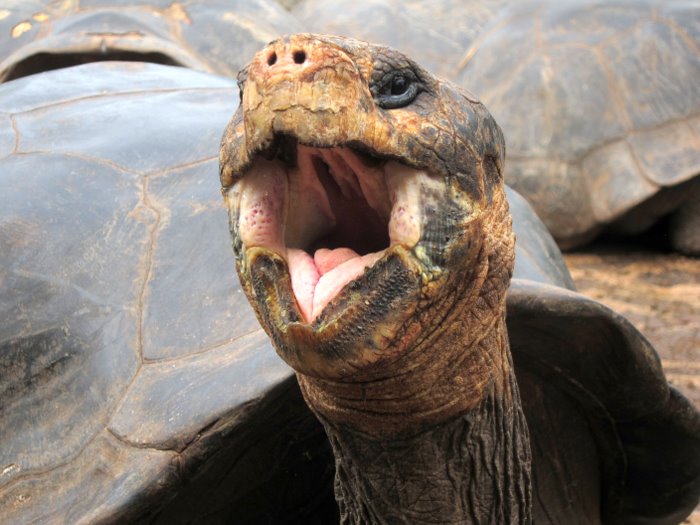
Galapagos, Ecuador
We’re in the Galapagos!
*excited giggles*
Assuming everything goes smoothly as planned, when this post published we should be in the middle of our Galapagos cruise.
Which was not according to plan at all.
We weren’t planning to visit the Galapagos this early on our trip, and the original plan was to explore the islands as day trips as opposed to a cruise.
But things just kind of turned out differently, thanks to a thief. A car thief who decided to break into a dirty, California plate van parked in Quito’s Mariscal district.
Wait? What?
Well, I hate to leave you guys hanging, but I’m going to let our friends, Niel and Miin tell their stories in their own way.
But suffice to say, without the incident we wouldn’t be sharing a ride with them to Quito and we wouldn’t have ended up inside a travel agent’s office in Quito. A travel agent who specializes in last-minute flights to Puerto Ayora and last-minute Galapagos cruises.
Someone who is also well-equipped in dealing with couples who can’t keep their dates straights and minds made up.
Until the very last minute.
Anyway, there will more stories and pictures coming up in the next week. In the meanwhile, let’s focus on the fun part right now. Which is:
Otavalo, Ecuador
Otavalo is known for its artesans market that’s held every Saturday. We got in to Otavalo after a long day of border crossing from Colombia on Friday and we were excited to see the market.
With Jack’s love for souvenir shopping and my love for bargaining, we had a feeling that Otavalo’s artesans market would be right down our alley.
And it surely didn’t disappoint.
We got there around 8 am, when the market was just getting started. On any other day, the market is limited to the Plaza de Los Ponchos itself but on Saturdays, the main market day, the stalls overflow to the neighboring streets as far as 4 blocks away.
The selection of items were overwhelming. Scarves, beanies, hats, sweaters, bracelets, keychains, bags, blankets, purses… you name it.
The array of options in Otavalo market, Ecuador
Jack walking among the hundreds of merchandise in Otavalo market, Ecuador
After awhile you start noticing that most are selling the same stuff – the same sweaters, the same bracelets, or the same paintings. But if you look harder, you notice that some of the paintings were of better quality (look out for paintings done on a piece of feather) and some of the materials are better than others.
The colors were amazing. Some of the cloths they were selling in the market were so beautiful they made my hands itchy to touch them, to bargain for them, and to carry them home with me close to my bosom.
There were blankets made from alpaca wool with interesting designs (usually llamas), so soft to the touch. The colors are more muted but they were just as tempting.
Seriously, if we didn’t keep reminding ourselves that we’d have to lug around everything we bought there around the world, we’d have been in serious trouble.
Otavalo market is definitely a prime people watching spot
Most of the sellers there are native Otavalos – the women would be wearing strings of gold necklaces and dressed in long black skirts and white embroidered shirts, while the men wore a black hat and a dark-colored poncho. Their long hair braided and wrapped in colorful ribbons.
The older women there were deceptively strong – you see them with nary a tooth and hundreds of wrinkles on their faces but at the end of the day, they’ll be carrying everything they’re selling in a ginormous bundle on their backs.
Unfortunately most of them were shy of being photographed, and those that were not shy asked for a $1 for a photo. I don’t really want to pay for photo ops but nor do I want to take pictures without permission, so I’ll stick to taking pictures of the stuff they were selling.
(Curious to know – would you pay for photo ops? Why and why not?)
Fried/roasted whole pig at Otavalo market, Ecuador
There was a row of stalls selling food – fried whole fish, fried whole pigs, and fried whole chicken. There were also people pushing carts or carrying baskets selling local snacks. Unfortunately we’re still not familiar with the snacks yet so we can’t tell you what they’re called (or even what they are), but one that caught my attention was boiled little black beans, eaten with salt and lime.
Or so we thought, until we looked closer. Ack! Not beans! They’re actually boiled little hermit crabs.
We stopped to get lunch consisting of fried fish and rice ($1.50). Simple but delicious. We decided to skip on the hermit crabs.
There’s actually another market held in Otavalo on Saturdays – the animal market which is located slightly outside the town center. I was intrigued, but decided to skip it against my inner curiosity. Not only do you have to get there early (it starts at 4 am), but last time I went to an animal market I stopped eating beef and chicken.
Not sure what they are? Rugs?
When shopping in Otavalo market, bargaining is expected. As a general rule, I usually start with a price already in mind and go slightly lower than that and see where it goes. Unless the price is already ridiculously low. When the opening price of a bracelet is 25 cents, there’s not much lower it can go, is there?
Tips for bargaining:
– Already have a price in mind for how much you’re willing to pay for an item.
– Have fun – if you get there early ask for an early bird’s discount, if you get there late, ask for the end of a day discount. If it’s raining ask for a rainy day discount… you get the gist.
– Watch out for pickpockets. You tend to be less aware of your surrounding when bargaining.
Do you want to check out our loot?
We bought a lot of bracelets – most are about 25 cents – 30 cents a piece.
Bracelets, Otavalo, Ecuador
A scarf for $3 – down from $5.
I actually didn’t even want it, but Jack was having too much practising bargaining and before I knew it, they already settled on a price. Once a price is agreed upon, it’s in bad taste to walk away.
An alpaca sweater for $12 – down from $16
Alpaca is supposed to be warmer than wool and softer too. Otavalo is cold. I’m thinking I might get a sweater too.
You might notice that the price is cheap, but not ridiculously cheap. But part of going shopping in Otavalo is not so much to load up on dirt-cheap items (that’s what Walmart is for), but for the atmosphere, for the people watching, and for the enjoyment of bargaining.
You should visit Otavalo market
If you like shopping, you will enjoy Otavalo market
If you like shopping, people watching, and you love bargaining, you will love Otavalo market.
See more photos from the market:
 |
| 05-28 Otavalo Market |
—
Info on Otavalo
Where: Otavalo is 2 hours south of the border with Ecuador and 2 hours north of Quito.
When: Check out the market on a non-Saturday day for a quieter experience. We actually prefer it because there’s less options and less duplications on the items sold.
Accommodation: We stayed in Hosteria Rose Cottage, 2 blocks away from the plaza.
Food: Best meal we’ve had in Otavalo: a Mexican place a block away towards the plaza from our hostel, next to a Chinese restaurant.







